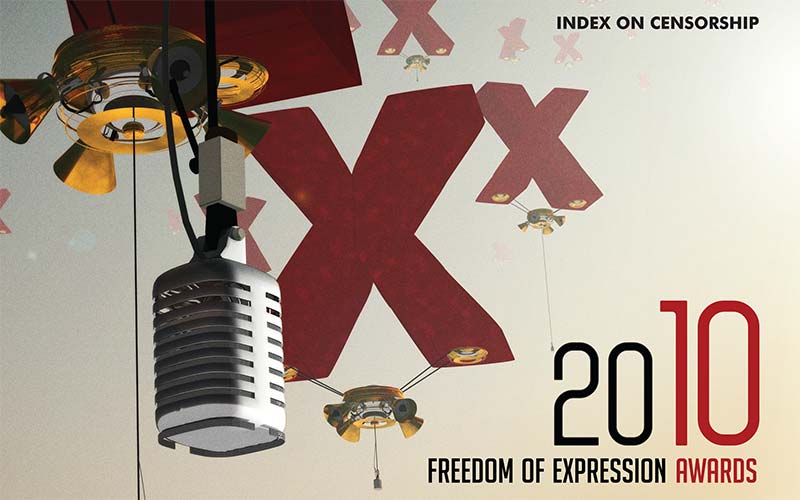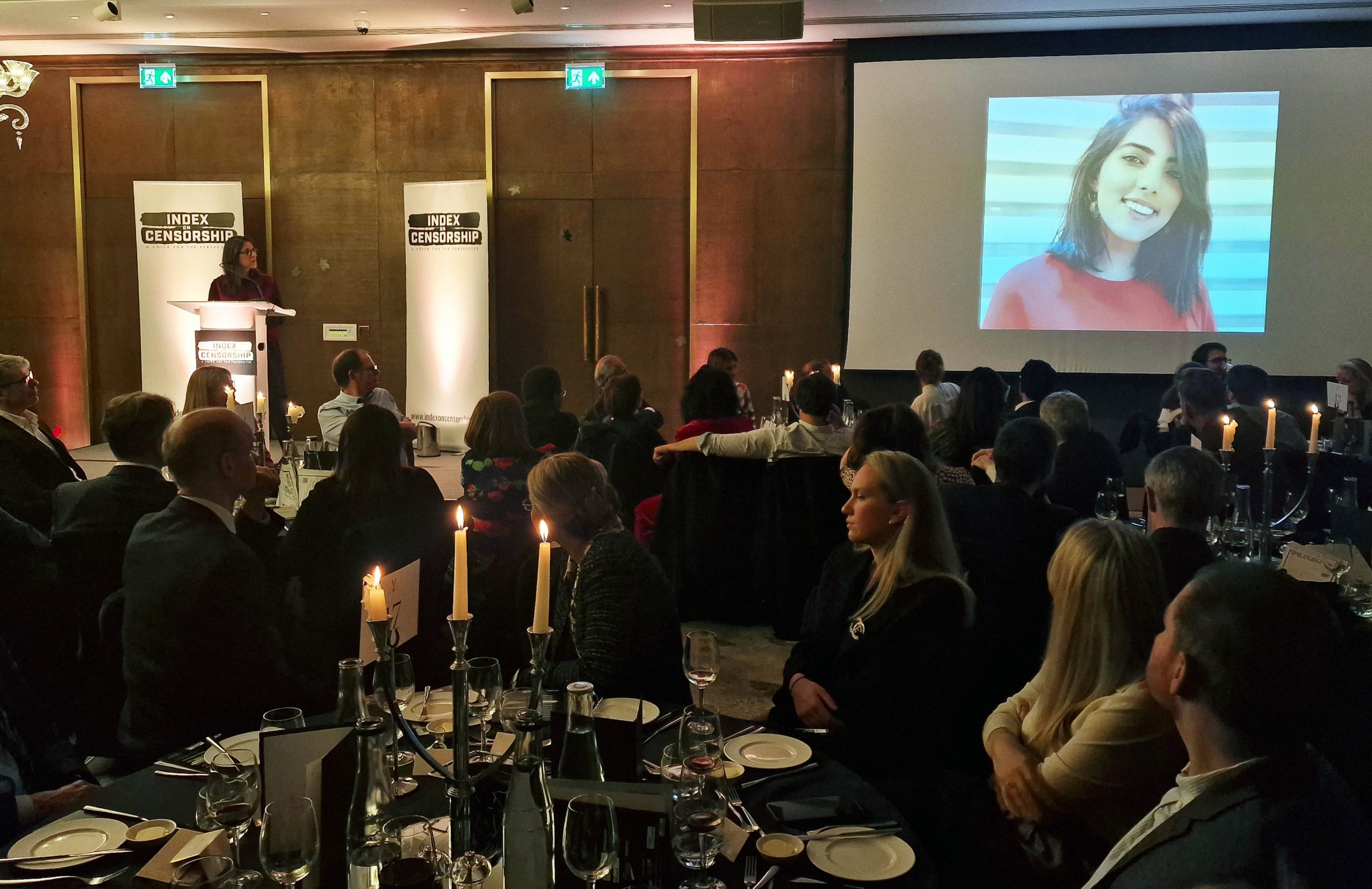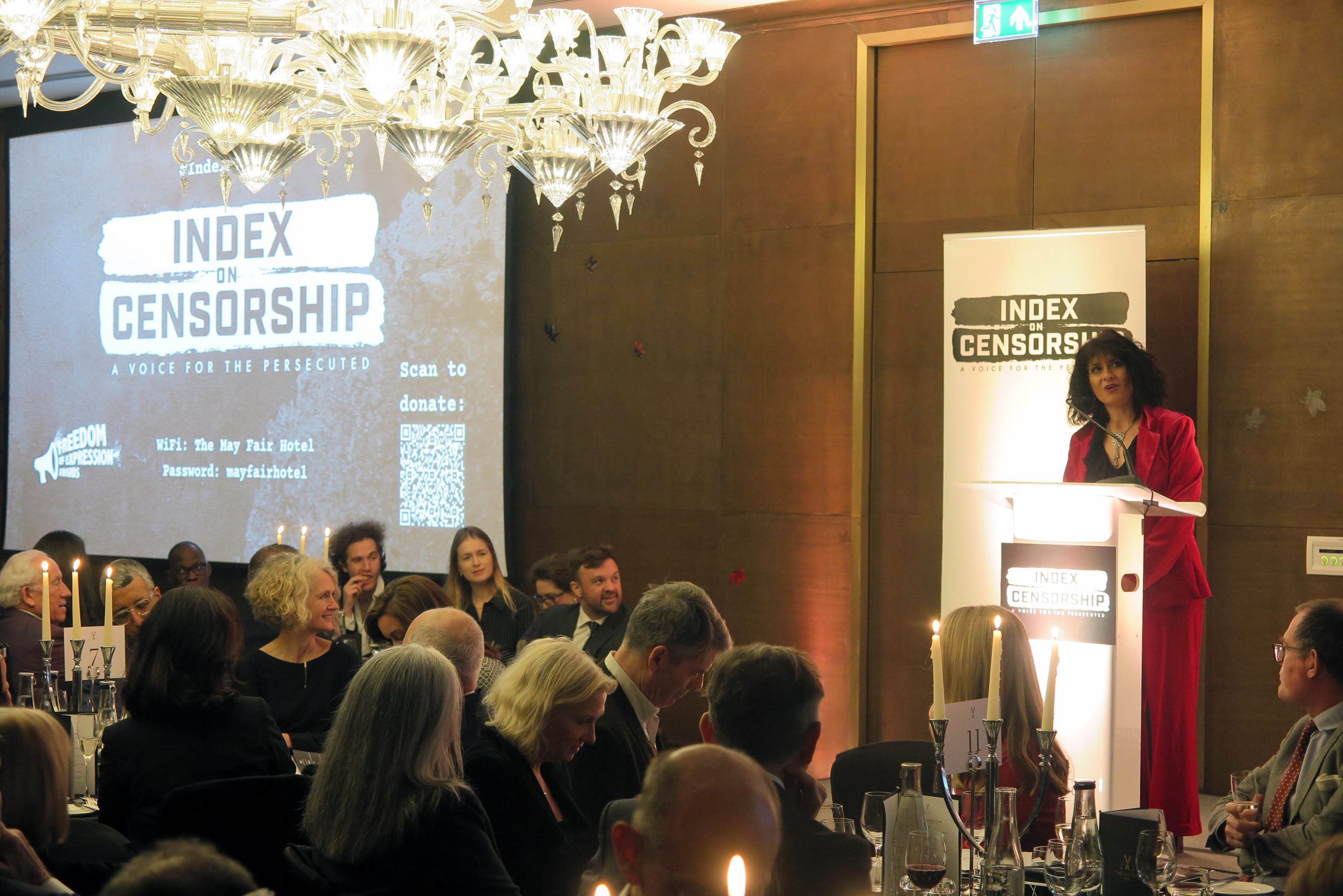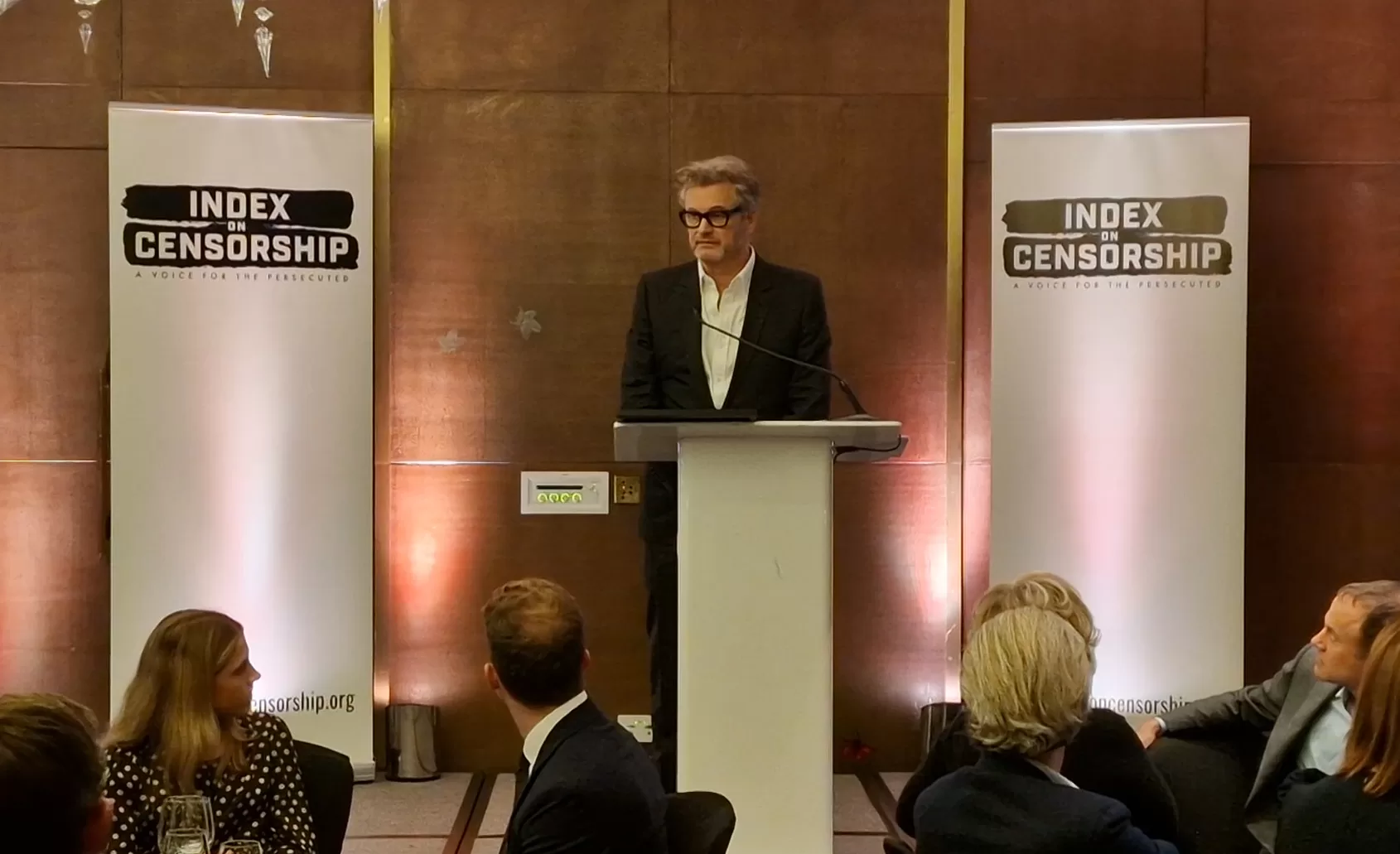[vc_row full_width=”stretch_row_content_no_spaces” full_height=”yes” css_animation=”fadeIn” css=”.vc_custom_1556717524900{background-image: url(https://www.indexoncensorship.org/wp-content/uploads/2010/03/awards-2010-1460×490.jpg?id=81563) !important;background-position: center !important;background-repeat: no-repeat !important;background-size: cover !important;}”][vc_column][/vc_column][/vc_row][vc_row][vc_column width=”1/2″][vc_custom_heading text=”FREEDOM OF EXPRESSION AWARDS 2010″ use_theme_fonts=”yes”][vc_column_text]Index on Censorship’s Freedom of Expression Awards exist to celebrate individuals or groups who have had a significant impact fighting censorship anywhere in the world.
- Awards were offered in five categories: Campaigning, Journalism, Publishing, Music and New Media
- There was a Special Commendation for journalist Heather Brooke
- Winners were honoured at a gala celebration in London at the Royal Institute of British Architects
[/vc_column_text][/vc_column][vc_column width=”1/2″][vc_single_image image=”81571″ img_size=”full”][/vc_column][/vc_row][vc_row][vc_column width=”1/3″][staff name=”Twitter” title=”New Media Award” profile_image=”81581″]Twitter is a free social networking and micro-blogging service that enables users to send and read messages with a 140-character limit. Twitter was thrust to the fore of international politics during the contested 2009 Iranian elections. During the huge protests that followed, the site played a pivotal role in mobilising protesters and facilitated a direct line of communication between demonstrators, news outlets and engaged people around the world. Maintaining its service in the face of a totalitarian regime, Twitter demonstrated how social networking can have a direct impact on the world stage. It was also used as a powerful tool in protecting free expression in the UK when solicitors Carter-Ruck, acting on behalf of Trafigura, the multinational oil company, tried to prevent the press from publishing details of a parliamentary question about a report into the alleged dumping of toxic waste in the Ivory Coast. Within hours, “#trafigura” and “#carterruck” were the site’s most popular topics.[/staff][/vc_column][vc_column width=”1/3″][staff name=”Rashid Hajili” title=”Bindmans Law and Campaigning Award” profile_image=”81577″]Rashid Hajili is the chair of the Media Rights Institute in Azerbaijan, which monitors free expression and works for the protection of journalists and bloggers. In a country with an ever worsening record on press freedom, Hajili is one of a small group of individuals who defends the rights of journalists and advocates for greater access to information. He has defended a number of prominent journalists, including imprisoned editor Eynulla Fatullayev. A leading voice in the campaign for media law reform in the country, Hajili is a prolific writer and tireless campaigner who has drafted legislation on protection of sources and broadcasting freedom. In December 2009, he worked with the organisation Article 19 on a case in the European Court of Human Rights to decriminalise defamation. “A country where freedom of speech is suppressed cannot have a positive image in the international community,” says Hajili. “Lack of tolerance to criticism means that democratic principles and values do not function in this country.”[/staff][/vc_column][vc_column width=”1/3″][staff name=”Radio La Voz” title=”Guardian Journalism Award” profile_image=”9072″]Operating in Bagua Grande in the Utcubamba Region of Peru, Radio La Voz was founded in 2007 by respected broadcast journalist Carlos Flores Borja and his sons. The station’s aim is to broadcast cultural programmes and information about environmental protection and human rights, fight political corruption and support local communities. Radio La Voz lost its licence in 2009 after the government accused the station of “supporting violence against security forces” when deadly clashes shook the area. Thirty-four people were killed as Amazonian communities protested about the opening up of huge tracts of land to foreign investment. To date no government representative has offered any evidence to support the veracity of its allegation against the radio station. Flores Borja says that La Voz was only doing its duty as an independent media source. He claims “the government took advantage of the moment to silence a voice critical of its policies”. On 16 February 2010, the case against Radio La Voz was dropped.[/staff][/vc_column][/vc_row][vc_row][vc_column width=”1/3″][staff name=”Andalus Press” title=”Sage International Publishing Award” profile_image=”81574″]Founded in 2000, Andalus is a unique Israeli publishing house dedicated to the translation of Arabic literature and prose into Hebrew. The name reflects nostalgia for the period in Andalusia between the 8th and 15th centuries when Jewish and Arab cultures co-existed. Publisher and founder Yael Lerer hopes to reverse the decline of Hebrew-speaking Israelis reading Arab literature and promote a greater understanding of the region’s Arabic cultural heritage in Israeli society. Andalus publishes literature from Lebanon, Syria, Sudan and Algeria – countries it is nearly impossible for ordinary Israelis to visit – as well as Palestinian writers and poets. Andalus’s translations have appeared in Israeli schools and universities and have also encouraged other publishing houses to re-examine Arabic literature and scholarship.[/staff][/vc_column][vc_column width=”1/3″][staff name=”Mahsa Vahdat and Ferhat Tunç” title=”The Freemuse Award for Music” profile_image=”106574″]Iran has a vibrant underground music scene that explodes tired clichés about Iranian society, and Mahsa Vahdat is a fabulous example of this sub-culture. Vahdat resists the pressures placed on female musicians by conservative sectors of Iranian society. In 2009, she recorded an album with American Mighty Sam McClain called Scent of Reunion – Love songs across civilizations. She was also featured in the powerful film about underground music in Tehran called No One Knows About The Persian Cats. She has shown courage and bold resistance in continuing to follow her artistic ambitions despite obstacles.
For almost three decades Turkish musician Ferhat Tunç has insisted on exercising his right to perform his music, ignoring several court cases and other threats against him in recent years. He has continued to sing in the minority language Zaza (Dimli) and in Kurmanci (Kurdish), as well as in Turkish. He has firmly refused to succumb to any form of intimidation, without expressing any hatred against its perpetrators. Through his brave stand against censorship, Ferhat has actively propagated the strengthening of human rights and democracy in Turkey.[/staff][/vc_column][vc_column width=”1/3″][staff name=”Heather Brooke” title=”Special Commendation” profile_image=”81575″]Without journalist Heather Brooke’s tireless campaign to uncover details of MPs’ expenses, we might never have discovered the details of MPs’ duck houses, moats and trouser presses. Her dogged five-year freedom of information battle was later made into a film by BBC4. In 2008, Brooke won a High Court case against the House of Commons authorities, which forced them to release full details of MPs’ second home allowances. The court said: “We have no doubt that the public interest is at stake. We are not here dealing with idle gossip, or public curiosity about what in truth are trivialities. The expenditure of public money through the payment of MPs’ salaries and allowances is a matter of direct and reasonable interest to taxpayers.” Brooke is the author of The Silent State and Your Right to Know, a citizens’ guide to using the Freedom of Information Act. She is a consultant and presenter on Channel 4 Dispatches documentaries and an honorary professor at City University’s Department of Journalism.[/staff][/vc_column][/vc_row][vc_row][vc_column][vc_custom_heading text=”JUDGING” font_container=”tag:h2|text_align:center” use_theme_fonts=”yes”][vc_column_text]
Criteria – Anyone involved in tackling free expression threats – either through journalism, campaigning, the arts or using digital techniques – is eligible for nomination. Any individual, group or NGO can nominate or self-nominate. There is no cost to apply.
Judges look for courage, creativity and resilience. We shortlist on the basis of those who are deemed to be making the greatest impact in tackling censorship in their chosen area, with a particular focus on topics that are little covered or tackled by others. Nominees must have had a recognisable impact in the past 12 months.
Where a judge comes from a nominee’s country, or where there is any other potential conflict of interest, the judge will abstain from voting in that category.
Panel – Each year Index recruits an independent panel of judges – leading world voices with diverse expertise across campaigning, journalism, the arts and human rights.
The judges for 2010 were:
[/vc_column_text][vc_row_inner][vc_column_inner width=”1/3″][staff name=”Shaheed Fatima” title=”Barrister” profile_image=”81569″]Shaheed Fatima is a barrister whose work encompasses a wide range of human rights work, advising and acting for governments, NGOs and individuals on constitutional and human rights issues. Fatima won the Liberty/Justice Human Rights Lawyer of the Year Award in 2007 and has been ranked in both Chambers & Partners 2010 and Legal 500 2009. She has appeared in many cases, including recently at the European Court of Human Rights in a key case regarding the applicability of Articles 2 and 3 of the European Convention on Human Rights to killings by British soldiers in post-war Iraq.[/staff][/vc_column_inner][vc_column_inner width=”1/3″][staff name=”Emily Bell” title=”Director of Digital Content, Guardian News and Media” profile_image=”81567″]Emily Bell has worked for the Observer and the Guardian for the past 18 years, setting up mediaguardian.co.uk in 2000 and becoming editor-in-chief of Guardian Unlimited in 2001. In September 2006, Bell was promoted to the new position of director of digital content for Guardian News and Media. Guardian.co.uk, the Guardian and Observer’s network of websites, has won many awards, including the prestigious Webby for Best Newspaper on the web in 2005, 2006, 2007 and 2009. Bell writes a regular column for Media Guardian on media policy issues.[/staff][/vc_column_inner][vc_column_inner width=”1/3″][staff name=”Lemn Sissay” title=”Poet” profile_image=”81568″]Lemn Sissay is artist-in-residence at Southbank Centre and is an Artsadmin artist. Sissay is the author of five poetry collections and a number of stage plays. The Independent on Sunday described his poetry as “the songs of the street, declamatory, imaginative, hard-hitting”. Sissay is a patron of The Letterbox Club, an initiative to get books to children in social services care. He writes and presents radio documentaries and is a regular contributor to Radio 4’s Saturday Live. His short film What If was recently exhibited at the Royal Academy as part of its GSK Contemporary season.[/staff][/vc_column_inner][/vc_row_inner][vc_row_inner][vc_column_inner width=”1/3″][staff name=”Caroline Michel” title=”Chief Executive, PFD” profile_image=”81566″]Caroline Michel is Chief Executive of PFD, according to the Guardian “the most talked-about” literary agency. She joined PFD in 2007 – having previously worked at the rival William Morris Agency – with the aim of transforming PFD into a multi-faceted, talent-seeking agency spanning multimedia, books and television. In total, Michel has over 25 years’ experience in publishing, having run the Vintage imprint at Random House and Harper Press at HarperCollins. She is also a governor of the British Film Institute and a board member of English PEN.[/staff][/vc_column_inner][vc_column_inner width=”1/3″][staff name=”Lindsey Hilsum” title=”Journalist, Channel 4 News” profile_image=”80223″]Lindsey Hilsum is international editor for Channel 4 News. She won the 2005 Royal Television Society (RTS) Journalist of the Year award for her reporting from Fallujah and Beslan. In 2003 she won the RTS Specialist Journalist of the Year award for her reports from the Palestinian refugee camp Jenin. During the 2003 Iraq war, she spent 10 weeks in Baghdad, and was in Belgrade during the NATO Kosovo campaign. She has spent extended periods in Zimbabwe and the Middle East, and headed C4N’s Beijing bureau from 2006 to 2008, covering the Tibetan uprising, the Sichuan earthquake and the Olympics.[/staff][/vc_column_inner][vc_column_inner width=”1/3″][/vc_column_inner][/vc_row_inner][/vc_column][/vc_row][vc_row][vc_column][vc_custom_heading text=”2010 GALA” font_container=”tag:h2|text_align:center” use_theme_fonts=”yes”][vc_media_grid element_width=”3″ grid_id=”vc_gid:1556717940555-e12333e1-b318-1″ include=”81628,81627,81626,81625,81624,81623,81622,81621,81620,81619,81618,81617,81616,81615,81614,81613,81612,81611,81610,81609,81608,81607,81606,81605,81604,81603,81602,81601,81600,81599,81598,81597,81596,81595,81594,81593,81592,81591,81590,81589,81588,81587,81586,81585,81584,81577,81576,81575,81574,81571″][/vc_column][/vc_row]





